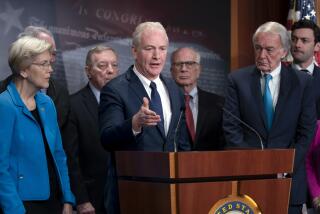Pakistan lawmakers approve guidelines for ties with U.S.
- Share via
ISLAMABAD, Pakistan — Pakistan’s parliament on Thursday approved guidelines that will frame a reset of the country’s relations with the United States, paving the way to end a nearly five-month disruption in ties that began when errant U.S. airstrikes killed 24 Pakistani soldiers along the Afghan border.
The guidelines called for halting U.S. drone strikes on Pakistani territory but put no mechanism in place to enforce such a ban. Most Pakistanis see the air campaign as a blatant breach of their country’s sovereignty.
The guidelines, unanimously passed by lawmakers, also did not explicitly address when the U.S. can resume using Pakistan as a transit country for Afghanistan-bound NATO supplies. The issue of supply routes, shut down since the deaths of the Pakistani soldiers Nov. 26, was left up to President Asif Ali Zardari’s administration.
Outside parliament, lawmakers said the routes probably would be opened soon, though no timetable was set. The only condition parliament imposed was that the NATO material moved through Pakistan cannot include weapons or ammunition, a moot point because the alliance’s convoys had carried only nonlethal supplies.
Washington will probably welcome Pakistani lawmakers’ actions. Though Pakistan has proved to be an extremely difficult partner in the fight against terrorism, the U.S. continues to seek its cooperation in pursuing Al Qaeda-linked militants in the country’s northwest and in facilitating talks between Afghan officials and the Afghan Taliban leadership. Pakistan’s role in ending 10 years of war in Afghanistan is viewed as significant, largely because top Afghan Taliban leaders are believed to be based in Pakistan.
The Nov. 26 attack, which Pakistan insisted was unprovoked and deliberate, was just one of a string of events last year that deeply angered Pakistanis. In addition, two Pakistani men were slain by a CIA contractor in Lahore and U.S. commandos killed Al Qaeda leader Osama bin Laden in the military city of Abbottabad. The latter raid incensed Pakistani military and civilian leaders because they were not informed of it in advance.
The ban on North Atlantic Treaty Organization convoys affected about 40% of the alliance’s nonlethal supplies, which had been moved by trucks from the Pakistani port city of Karachi to Afghanistan.
Drone strikes ceased for six weeks after the November attack, but resumed in mid-January.
The Pakistani review of relations with the U.S. was slowed by opposition parties that wanted to make a cessation of drone strikes a condition to the reopening of NATO supply routes. But on Thursday those parties acquiesced and backed the guidelines.
More to Read
Sign up for Essential California
The most important California stories and recommendations in your inbox every morning.
You may occasionally receive promotional content from the Los Angeles Times.













